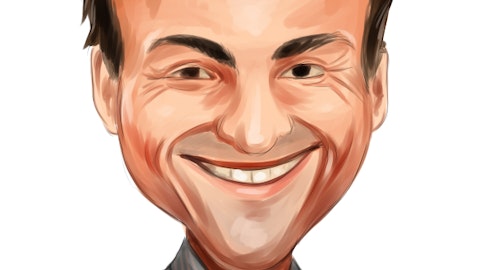Gareth Joyce: Steven, the backlog has orders in it that can be as far out as 12 to 18 months ago. So yes, we could be producing units for example, in the middle of this year for contracts where we received the order 12 months ago. Yes. So they were done at — I’m going to say, we’re still sort of legacy pricing — we work through our entire order book and exercise all the opportunity we could to gain your price position based on contract language. But that was not something you could achieve for every single transaction. In addition to that, as is widely known, we’re still seeing inflationary pressure coming through in our raw material and supply chain environments. So making the decisions like we have to consolidate our production in Greenville for transit buses and moving the LA battery production to grow towards the end of the year, these are critical steps for us to continue to take cost out of the system as we look to optimize gross margin.
And that applies to logistics, consolidation of operations, fixed cost absorption, et cetera. So yes, it might seem like it’s something where we should simply be able to just price for it. But when you have long-term contracts that are negotiated 12 to 18 months back, it still has to work its way through the system in some of these agreements. Having said that, I will also tell you that middle of last year, we effected a very focused strategy to ensure that the future opportunities that are brought into our order books are done at better gross margins. And we certainly believe that the order book as time passes, does have improving quality gross margins, both in Powered and on the Transit side of the business.
Steven Fox: Okay. That kind of brings me to my second question, especially with all the puts and takes around gross margin, which is, given the growth the company has and the backlog, would it be prudent to sort of slow down the business — the pace of business here and to get the cost structure in line and slow down the cash burn so that the company doesn’t put itself into any kind of further jeopardy from a balance sheet standpoint, especially given how the capital markets are right now?
Gareth Joyce: It’s a great question. I think you’ll note that in our prepared remarks, we commented on the fact that in our revenue guidance for 2023, we expect modest growth in the transit business. That is exactly as a result of us taking a decisive action to ensure that our production output is well balanced and not focused entirely on growth to ensure that we’re managing capital consumption as we navigate working capital topics, for example, in a fast-growing business. So we are doing exactly that.
Operator: Our next question comes from Sherif El-Sabbahy from Bank of America.
Sherif El-Sabbahy: I just wanted to ask, are you seeing any turns around…
Gareth Joyce: Sherif, I’m terribly sorry to interrupt you, but we can barely hear you. Perhaps you can try and get closer to your microphone, I’m sorry.
Sherif El-Sabbahy: Yes. Is this better?
Gareth Joyce: That’s better. Thank you.
Sherif El-Sabbahy: Just in terms of customer — end customer financing, we’ve seen some of your customers highlight difficulty for end users lining up financing. Do you see this as a potential headwind in the coming year for the Powered business?
Gareth Joyce: I think if what you’re referring to is things like prepayments from customers to secure capacity as a means to provide sort of access to capital, that’s something we continue to think about as we explore contracts with our customers. I’m not sure if that’s what the question was directed at.
Sherif El-Sabbahy: And just in terms of actual end customers having difficulty lining up financing to purchase the vehicles. Are you seeing any potential impact from that in compensations?





